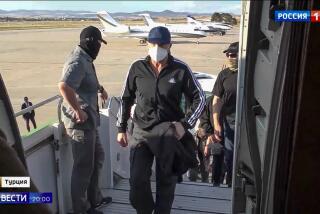2 Convicted in 1998 Slaying of Russian Lawmaker
- Share via
MOSCOW — A St. Petersburg court Thursday convicted an organizer and a gunman in the murder of one of post-Soviet Russia’s most prominent democracy activists, sentencing the men to long prison terms. But many questions remained unresolved, including whether someone else ordered the killing.
The 1998 slaying of lawmaker Galina V. Starovoitova, widely viewed as a political assassination, provoked a wave of anger and shock across the country and around the world. The 52-year-old grandmother who came to prominence as a human rights activist was gunned down in the stairwell outside her apartment.
The slaying prompted former acting Prime Minister Yegor T. Gaidar to declare that “a mortal danger is hanging over democracy in Russia.”
Six people from the Bryansk region, 210 miles southwest of Moscow, were tried for allegedly organizing and carrying out the killing.
Yuri Kolchin, an ex-military intelligence officer with ties to a former ultranationalist lawmaker, was convicted as an organizer and sentenced to 20 years’ imprisonment. Vitaly Akishin, convicted as a gunman, was sentenced to 23 1/2 years in prison. Two defendants were acquitted, and two others had their charges reduced to offenses for which the statute of limitations had expired, the Russian news agency Itar-Tass reported.
Ruslan Linkov, Starovoitova’s aide who was shot and injured at her side, said he had testified against Akishin and felt “absolutely certain that he was the man who was shooting at Galina and myself.” He described Kolchin as “a technical link” in the murder.
“But the middleman and the real mastermind are still at large,” Linkov asserted. “I believe there is a lack of political will to investigate this case thoroughly and find the main culprits.”
Linkov said investigators had told him privately that they were “not allowed to explore certain directions in the case.”
Yuly Rybakov, chairman of the St. Petersburg Anti-Nazi Center, a human rights organization, also said he thought “some very influential people in Moscow, not necessarily in the Kremlin, were trying to prevent the case from being explored any deeper.”
But Valery Kuznetsov, a Federal Security Service spokesman in St. Petersburg, told state-run television that serious investigative work would continue. “Painstaking and intense work is being conducted, aimed at those who ordered this crime,” he said. “That is why we will certainly be informing mass media about this criminal case in the future.”
Rybakov said he was “amazed” that four of the defendants were freed.
“Despite the fact that the released defendants were involved in buying weapons, finding spots for sniper fire, and after the crime they were destroying the evidence, burning the bloodied clothes of the killers, the judge decided that they didn’t know about the murder plot and thought they were just involved in surveillance procedures,” Rybakov said.
“It is very odd because now it will be very difficult to get them to cooperate in finding other people involved in the crime and those who ordered it,” he added.
One of the defendants testified that Mikhail Glushchenko, a former lawmaker with the ultranationalist Liberal Democratic Party, had wanted Starovoitova’s telephone to be tapped, the Russian news agency RIA Novosti reported.
Glushchenko is also a reputed boss in a criminal gang based in the central Russian city of Tambov. Russian media reports have suggested that he was considered a possible suspect in the assassination, either for ordering the attack or passing on such an order. His whereabouts are unknown. Testimony during the trial established Kolchin as “an informal aide” to Glushchenko.
Another former Liberal Democratic lawmaker, Vyacheslav Shevchenko, also had been publicly linked to the case. He too was reputed to be a member of the Tambov gang. Shevchenko’s body was found wrapped in a plastic bag in a villa in Cyprus in March 2004. Also found were the bodies of two other Russians.
Linkov, the aide who was injured in the shooting, indicated that anti-Semitism might have played a role in the killing of Starovoitova, a longtime supporter of Jewish interests. He said a defendant who cooperated with prosecutors during the trial testified that Kolchin, talking in Glushchenko’s office before the murder, had referred to Starovoitova as an agent of an international Jewish conspiracy.
Investigators had also explored a widely reported theory that Starovoitova had been carrying a large sum of money, Linkov said. But he said those reports were incorrect and the judge acknowledged in the verdict that it was a political killing.
Russian politics today, marked by weakness and division among pro-democracy parties, might be different had Starovoitova not been killed, said Rybakov, the rights activist.
“Of course Starovoitova was a strong and charismatic leader,” he said. “Were she alive now she could certainly play some kind of unifying role in the democratic movement, which is undergoing a deep crisis.”
*
Times staff writer Sergei L. Loiko contributed to this report.
More to Read
Sign up for Essential California
The most important California stories and recommendations in your inbox every morning.
You may occasionally receive promotional content from the Los Angeles Times.













